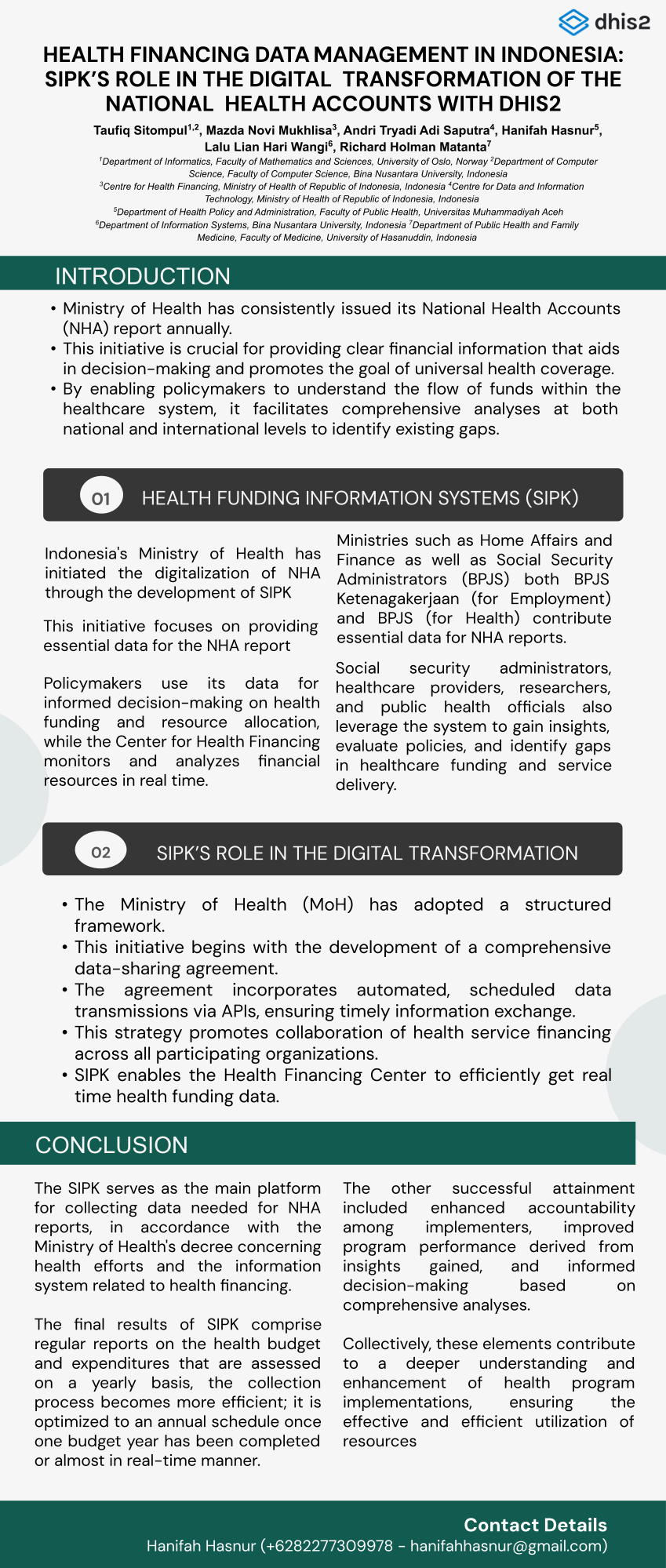Over the years, the Ministry of Health has consistently issued its National Health Accounts (NHA) report annually. This initiative is crucial for providing clear financial information that aids in decision-making and promotes the goal of universal health coverage. By enabling policymakers to understand the flow of funds within the healthcare system, it facilitates comprehensive analyses at both national and international levels to identify existing gaps.
In order to track the multiple funding sources and myriad health spendings, Indonesia’s Ministry of Health has initiated the digitalization of NHA through the development of Health Funding Information Systems (SIPK). This initiative focuses on providing essential data for the NHA report, with the objective of generating detailed health financing information for each budget year. The SIPK, owned and managed by the Indonesian Ministry of Health, serves a diverse range of stakeholders. Policymakers use its data for informed decision-making on health funding and resource allocation, while the Center for Health Financing monitors and analyzes financial resources in real time. Ministries such as Home Affairs and Finance as well as Social Security Administrators (BPJS) both BPJS Ketenagakerjaan (for Employment) and BPJS (for Health) contribute essential data for NHA reports. Social security administrators, healthcare providers, researchers, and public health officials also leverage the system to gain insights evaluate policies, and identify gaps in healthcare funding and service delivery. Overall, SIPK plays a crucial role in the effective data management of health financing.
Previously, the NHA report—specifically the DIS-Account report—was generated for two years following the last budget. This was due to lengthy procedures that typically took an average of a year to complete data collection and processing. To support the effort, the SIPK has been developed by building collaborative endeavors among key entities of the Indonesian Ministry of Health, notably including the Center for Data and Technology and the Center of Health Financing .
Developed based on DHIS2, the SIPK is designed to allow seamless and automated access to health financing information, thereby improving the efficiency of data collection.The Ministry of Health (MoH) has adopted a structured framework for facilitating data sharing among stakeholders involved in health financing. This initiative begins with the development of a comprehensive data-sharing agreement that outlines the needed metadata in alignment with the data standards. The agreement incorporates automated, scheduled data transmissions via APIs, ensuring timely information exchange. This strategy promotes collaboration of health service financing across all participating organizations. By allowing multiple data sources to be analyzed in a single platform, SIPK enables the Health Financing Center to efficiently get real time health funding data, thereby ensuring timely access to up-to-date data which encompasses all datasets from the National Health Account Module, which allows users to analyze the national health spending data in more reliable ways.
In conclusion, the SIPK serves as the main platform for collecting data needed for NHA reports, in accordance with the Ministry of Health’s decree concerning health efforts and the information system related to health financing. The final results of SIPK comprise regular reports on the health budget and expenditures that are assessed on a yearly basis, the collection process becomes more efficient; it is optimized to an annual schedule once one budget year has been completed or almost in real-time manner. The other successful attainment included enhanced accountability among implementers, improved program performance derived from insights gained, and informed decision-making based on comprehensive analyses. Collectively, these elements contribute to a deeper understanding and enhancement of health program implementations, ensuring the effective and efficient utilization of resources
